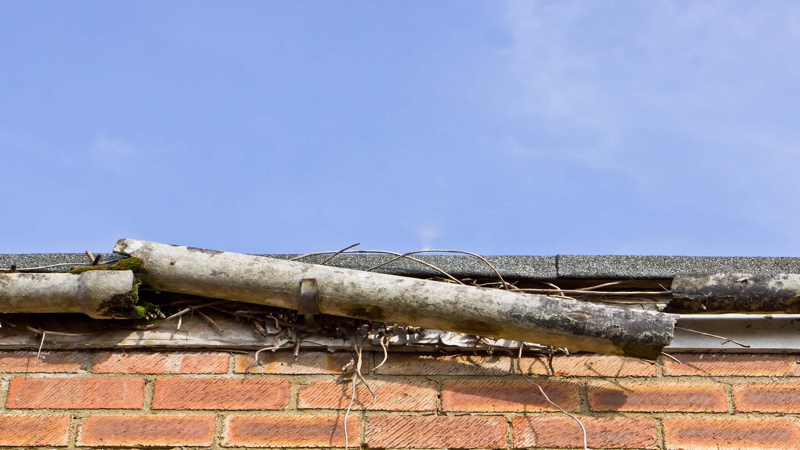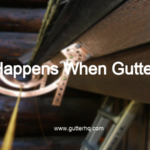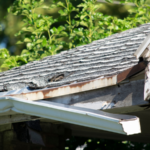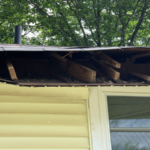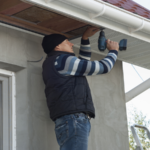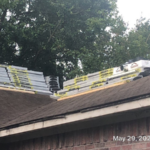- Foundation damage: When water collects at the base of your home, it can seep into your foundation and cause cracks or other damage.
- Soil erosion: The water flowing down your roof can also erode the soil around your home, leading to foundation problems and even sinkholes.
- Flooding: If the rain is heavy enough, the water flowing down your roof can cause flooding in your yard or even in your home.
Is it OK to have a house without gutters?
There are a few things to consider when making the decision to not install gutters on your home. The first is the climate. If you live in an area with a lot of rainfall, then gutters can help protect your home from water damage. However, if you live in an area with little rainfall, then you may not need gutters.
Another consideration is the type of roof you have. If you have a sloped roof, then gutters can help direct water away from your home. However, if you have a flat roof, then you may not need gutters because the water will just run off the sides of the roof.
Finally, you need to consider the type of siding you have on your home. If you have vinyl siding, then gutters can help protect it from water damage. However, if you have brick or stone siding, then you may not need gutters because the water will just run off the sides of the house.
How do you handle rain runoff without gutters?
- First, you need to calculate how much rainwater your home collects during a rainstorm. This will help you determine the size of the system you need to manage the runoff.
- Next, you need to determine where the rainwater will be directed. This may be to a specific area in your yard, or it may be directed to a storm sewer.
- Once you know where the rainwater will be directed, you need to choose the type of system you will use to manage the runoff. There are many different types of systems available, so be sure to do your research to find the best option for your home.
- Finally, you need to install the system you have chosen. This may be a simple process if you are using a pre-made system, or it may be more complex if you are customizing your own system.
What to do if you have no gutters?
- Inspect your home’s exterior regularly. Look for any cracks or gaps in your home’s siding or trim. These can allow water to seep in and cause damage.
- Keep your home’s foundation in good repair. Make sure that there are no cracks or gaps that could allow water to seep in and damage your foundation.
- Direct water away from your home. Make sure that your landscaping slopes away from your home so that water will run away from the foundation.
- Install a drainage system. If you live in an area with a lot of rain, you may want to consider installing a French drain or other type of drainage system. This will help to keep water away from your home and help to prevent foundation damage.
Why do Florida houses not have gutters?
There are a few reasons why Florida homes do not have gutters. One reason is that the weather in Florida is typically very warm and sunny, so there is not as much need for gutters to protect against water damage. Additionally, Florida is home to many tropical plants and trees that produce a lot of leaves and debris, which would clog gutters and make them difficult to maintain. Finally, gutters can be expensive to install and maintain, so many homeowners in Florida simply choose to do without them.
Why do old houses not have gutters?
One reason why old houses may not have gutters is that they were built before gutters were invented! Gutters were first used in Northern Europe in the 11th century, and didn’t become common in the rest of Europe and North America until the 19th century. So, if your house was built before 1800, it’s likely that it doesn’t have gutters.
Another reason why old houses may not have gutters is that they were built with materials that don’t require them. For example, many old houses are made of stone or brick, which are both very durable materials that can withstand a lot of wear and tear. Gutters are usually only necessary on houses made of wood, as they help to protect the wood from water damage.
So, there are a few reasons why old houses may not have gutters. But, even if your house doesn’t have gutters, there’s no need to worry! There are plenty of other ways to keep your house protected from the rain.
What happens to your house if you don’t clean the gutters?
If you don’t clean your gutters, your house will eventually fall apart. The gutters will get clogged with leaves and debris, which will cause water to back up and seep into your house. The water will damage your walls, your floors, and eventually your foundation. So, it’s important to keep your gutters clean, or you’ll end up paying a lot of money to repair your house.
Do gutters increase home value?
It is a common misconception that gutters only serve the purpose of keeping rainfall away from a home’s foundation. While this is one of their primary functions, gutters also play a role in protecting a home’s value. In fact, gutters are one of the most important, yet often overlooked, features of a home.
Gutters are designed to direct water away from a home’s foundation and prevent water damage. By keeping the foundation dry, gutters help to prevent cracks, leaks, and other types of damage. A home with a damaged foundation is less structurally sound and therefore, less valuable. In addition, gutters help to protect the landscaping around a home from being damaged by runoff water. Landscaping is one of the features that homebuyers look for when considering a home, so gutters that keep landscaping in good condition can help to increase a home’s value.
While gutters are not the most exciting feature of a home, they are an important part of its structure and can play a role in protecting its value.
Conclusion
If it rains and you don’t have gutters, the water will flow down your roof and could potentially damage your home. It is important to have gutters installed on your home to protect it from the elements.
